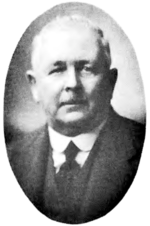Alec Clydesdale, Date of Birth, Place of Birth, Date of Death
TweetAlec Clydesdale
Australian politicianAbout Alec Clydesdale
- Alexander McAllister "Alec" Clydesdale MBE (16 July 1875 – 24 January 1947) was an Australian politician who served in both houses of the Parliament of Western Australia, as a member of the Legislative Assembly from 1921 to 1930 and as a member of the Legislative Council from 1932 to 1938. Clydesdale was born in Ballarat, Victoria, to Kate (née Glenn) and James Robert Clydesdale.
- He was articled to an architect for a period and then trained as a plumber.
- In 1894, during the gold rush, Clydesdale left for Western Australia, living first in Cue and later in Mount Magnet.
- He was elected to the Mount Magnet Municipal Council in 1899, aged only 24, and was later elected mayor.
- At the time of his election, he was believed to be the youngest mayor in the state.
- At the 1901 state election, Clydesdale contested the seat of Mount Magnet as a Ministerialist (a supporter of the government of George Throssell), but was defeated by Frank Wallace.In 1903, Clydesdale moved to Perth.
- He became involved with horse racing, serving as secretary of two racing clubs, and eventually came to own racecourses in Belmont, Bicton, and Kensington.
- Clydesdale was elected mayor of the South Perth Municipality in 1913, and would serve until 1921.
- In 1920, he was made a Member of the Order of the British Empire (MBE), for services to the war effort.
- At the 1921 state election, Clydesdale contested the seat of Canning for the Labor Party, defeating Robert Robinson of the Nationalist Party (a former attorney-general).Clydesdale was re-elected at the 1924 and 1927 state elections, but was defeated by Nationalist candidate Herbert Wells at the 1930 election.
- He re-entered parliament at the 1932 Legislative Council election, defeating Sir William Lathlain in Metropolitan-Suburban Province.
- In 1933, Clydesdale was appointed chairman of the State Lotteries Commission, but he had to resign the position the following year over a perceived conflict of interest.
- Clydesdale was defeated by James Dimmitt at the 1938 election, and was subsequently re-appointed to the Lotteries Commission.
- He died in Perth in January 1947, aged 71.
- Clydesdale had married twice, to May Smith in 1902, with whom he had three children, and to Lilian Knights in 1942.
Read more at Wikipedia


 Date of Birth:
Date of Birth:  Place of Birth: Ballarat, Victoria, Australia
Place of Birth: Ballarat, Victoria, Australia